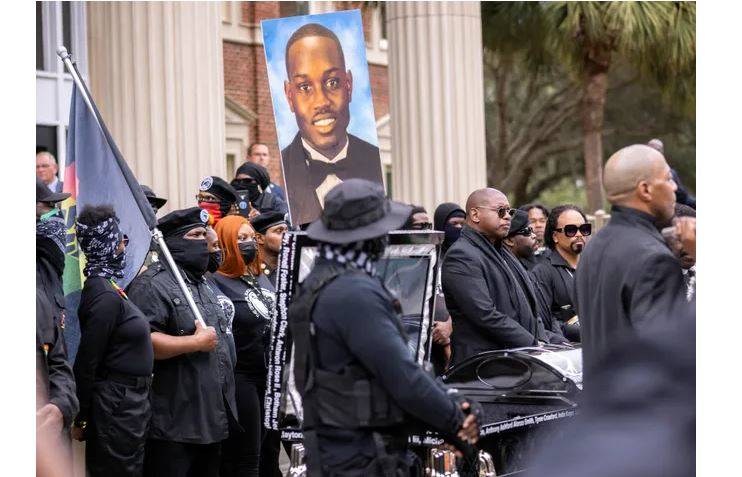Hours of final arguments were heard Monday by jurors in the murder trial of three Georgia men charged in the death of Ahmaud Arbery, as four attorneys provided different perspectives on what transpired on that day early last year.
Arbery was “under attack” by white guys who noticed a Black man running through their small coastal area and jumped in pickup trucks to chase him down, according to the prosecution.
Residents were on edge about violence in the neighborhood, defense counsel for two of the men said, and the men were attempting to detain Arbery for police. The third’s lawyer claimed that his client was only a witness who documented the murder.
Later Monday, the virtually all-white jury of 12 jurors and three alternates was due to hear the prosecution’s rebuttal. The hearings were set to begin on Tuesday.
Gregory and Travis McMichael, as well as their neighbor William “Roddie” Bryan, have been charged with murder and other offences in connection with a fatal shooting in Brunswick, Georgia, in February 2020. When Bryan’s smartphone video of the shooting was revealed two months after the shooting, they were arrested.
Here’s what you should know:
According to the attorney, William ‘Roddie’ Bryan was guided by ‘divine providence.’
Bryan’s defense counsel, Kevin Gough, told jurors that his client was led to record video of Arbery on the street that day by “divine providence,” and that Bryan served as a well-intentioned witness to the death.
Bryan, according to Gough, is a “normal man” who did not “actively” assist in the crime. He was “just equipped with a cellphone” at the time and had no idea the McMichaels were armed, according to Gough.
“Something is guiding Mr. Bryan down this street to document what’s going on,” Gough said, adding, “He’s being guided, whether that’s by a god, if you believe in god, or some other entity. But do you really believe it’s just coincidence or chance?”
Demonstrators from Black Lives Matter and the Black Panther Party demonstrate in Brunswick.
During closing arguments Monday, dozens of members of Black Lives Matter and the Black Panther Party demonstrated outside the Glynn County courtroom. Some people were observed with weapons.
Demonstrators carried a black casket with the names of dead Black people written on it, as well as a big image of Ahmaud Arbery. “Say his name out loud! Arbery, Ahmaud! “Protesters shouted slogans.
Bryan’s defense counsel, Kevin Gough, filed a motion for a mistrial due to the demonstration. The motion was refused by the judge.
Travis McMichael had’reasonable and probable suspicions,’ according to his lawyer.
Travis McMichael’s defense attorney told jurors that he was driven by “duty and obligation” to confront Arbery about a crime he suspected, and that he fatally shot Arbery in self-defense.
Attorney Jason Sheffield said the Satilla Shores neighborhood was on edge after a string of incidents, including the theft of construction equipment from a home’s owner.
McMichael was aware that a man had been seen on security video at the construction site, and he’d briefly encountered a man there two weeks before Arbery’s death, according to Sheffield. Sheffield claimed Arbery trespassed in the residence several times, as evidenced by camera, and that “no evidence of Ahmaud Arbery ever jogging or exercising in Satilla Shores” existed.
As a result, when McMichael spotted Arbery fleeing, he used his Coast Guard training to come to the conclusion that there were “reasonable and probable grounds of suspicion” that Arbery had committed burglary, Sheffield said.
According to Sheffield, Arbery did not attempt to defuse the situation by chatting to McMichael or running through a yard away from the guys pursuing him on the street. After a five-minute chase, McMichael shot Arbery in self-defense as he ran toward him, Sheffield said.
McMichael was “totally freaked out” after the shooting, Sheffield said. “If this was a case about wanting to murder a Black jogger, if this was really a case about that, Travis would not have reacted the way he reacted,” Sheffield said.
An attorney for Gregory McMichael, Laura Hogue, echoed many of the same points in her closing argument. Hogue said Gregory McMichael, a retired investigator, was “seeking to protect his community” and had “no doubt” that Arbery was the same man seen on surveillance video.
“A good neighborhood is always policing itself,” she said, adding, “The police can’t be everywhere, and in a safe, secure neighborhood, police are helped by those neighbors.”
Prosecutor asks, ‘Who brought the shotgun to the party?’
On Monday, prosecutor Linda Dunikoski said that the three defendants took hasty decisions based on suspicions that Arbery had committed a crime for which they had no proof. Dunikoski claimed that Arbery was slain because he refused to stop and speak with the men when they tried to interview him.
“They made their decision to attack Ahmaud Arbery in their driveways because he was a Black man running down the street,” Dunikoski said. She added: “This was an attack on Ahmaud Arbery.”
Arbery was observed on security video going around a nearby house under construction many times, according to Dunikoski, although he never took or destroyed anything.
While Arbery was inside the site the day he was killed, the three men had “no immediate knowledge” of that and determined Arbery committed a crime because he was running, Dunikoski said. She said the men later claimed they were making a citizen’s arrest to “justify their actions.”
Dunikoski argued the men cannot claim self-defense “because they were the initial, unjustified aggressors, and they started this.”
“Who brought the shotgun to the party?” Dunikoski asked, adding, “You can’t create the situation and then go ‘oh I was defending myself.'”
What are the charges in the murder of Ahmaud Arbery?
Gregory, 65, Travis McMichael, 35, and Bryan, 52, are accused with felony murder and malice murder, as well as two counts of aggravated assault and one case of false imprisonment and criminal attempt to commit false imprisonment.
Both counts of murder carry the possibility of a life sentence. The maximum sentence for aggravated assault is 20 years in jail. False incarceration can result in a sentence of up to ten years in jail. If the defendants are found guilty on numerous charges, the most serious charge will be used to determine their punishment.
Credit: USAToday







